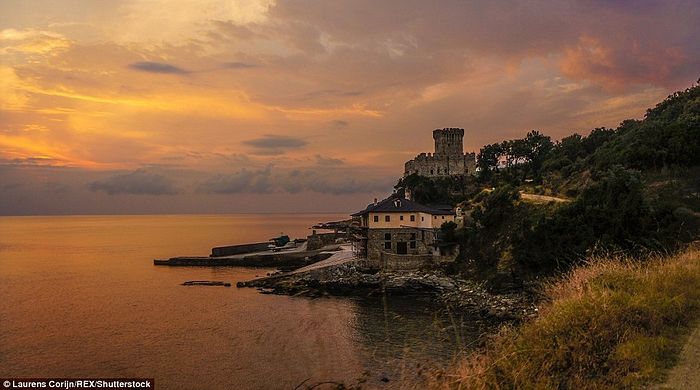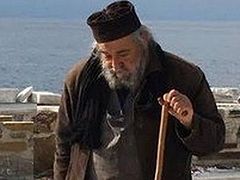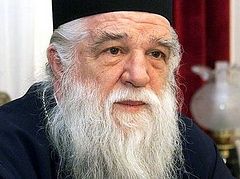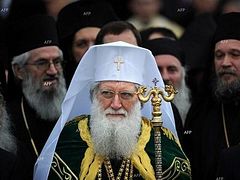Mt. Athos, August 3, 2017
A group of representatives from each of the 20 Athonite monasteries met recently to respond to the unrest that has arisen in the Church following last June’s council on the island of Crete that produced a number of documents, several of which have proved controversial. Their statement was eagerly awaited by many in the Church of Greece and throughout the greater Orthodox world, especially after a commission of the Sacred Community of Mt. Athos met in November 2016, issuing a letter to the Sacred Community which offered several critiques of the Crete documents.
The 206th Extraordinary Double Sacred Synaxis of the Holy Mountain, consisting of twenty extraordinary and ordinary representatives of the Holy Community met on June 17/30 to analyze a text, a translation of which is available on the blog Mystagogy. It is known in the Church of Greece that the text was composed not at the session itself, but beforehand by Archimandrite Vasileios (Gondikakis), the former abbot of both Stavronikita and Iveron Monasteries, who is known to be close to the patriarchate in Constantinople. Although the text has been issued on behalf of the entire Sacred Community, it is also know that several of the Athonite monasteries disputed the document.
The text is divided into four sections. The first addresses the unsettled atmosphere that has arisen throughout the worldwide Orthodox Church, stating, “There is no cause for agitation, as long as the Risen Lord is among us.” Further, noting that, as per Scripture, the Church is the pillar and ground of the truth, ever guided by the Holy Spirit, the document states that “all fear is unnecessary” and “neither agitations nor rejections are justified, which lead to schisms.” The statement also goes on to warn against not only schism, but heresy: “We have trust in the love of Christ, not in individual and stale opinions, which lead outside the Church and create the chastisements of heresies.”
This statement mirrors that of Archimandrite Vasileios in his February 3, 2016 article “On the Great Council of the Orthodox Church.” In this publication he spoke more openly, replying to the “superficial ecumenists and fanatical zealots,” who are “prisoners of one and the same prison. They are withdrawn into only their own view, deprived of the boldness of faith and love of truth.”
It is well known that several hierarchs, and even entire Local Autocephalous Churches, have rejected the documents of Crete, without veering into either schism or heresy. The Local Churches of Georgia, Bulgaria, and Antioch, and Russia did not attend the council, and the Orthodox Church in America was not invited. Several attending hierarchs of the Greek, Cypriot, and Serbian Churches refused to sign several of the documents at the council itself, and have continued speaking about the weaknesses and dogmatic errors of the Crete documents after the council. The well-respected Metropolitan Hierotheos (Vlachos) and Metropolitan Athanasios of Limassol have been especially vocal, especially concerning, although not limited to, the “Relations of the Orthodox Church With the Rest of the Christian World” document.
Fr. Vasileios further writes, “Before the Synod, the prepared texts were presented to the knowledge of the faithful with the possibility of expressing an opinion,” although he does not indicate when or where this happened. In his response to the Sacred Community’s text, Metropolitan Seraphim of Piraeus, known as a staunch defender of the Patristic Tradition, asks, “When did this happen and we didn’t know it? When were the texts given to the people to express an opinion? When?!” and goes on to note that not even hierarchs and Local Holy Synods reviewed the documents in their final pre-conciliar form before the council itself. Met. Hierotheos has written that the pre-conciliar documents “were unknown to most hierarchs and to myself, remaining holed-up in committees and we didn’t know their contents.”
The second section comments on the first: “In all this we do not want to suggest calm indifference, but to stress the importance of vigilance and the faith. We consider it an ingratitude towards God and a lack of love towards all the brethren—those near and far—unless we stress with all boldness and clarity the riches of the grace received by those living within the One, Holy, Catholic and Apostolic Church.”
The document goes on to speak of Christ as the Way, the Truth, and the Life, and the Good Shepherd Who died, resurrected, and ascended for the salvation of mankind, which we partake of through the ongoing grace of Pentecost in the Church.
The third section contrasts worldly leaders and shepherds to Christ the True Shepherd, stating, “They condemn and destroy others as the cause of wickedness, in order to correct the world.” The section ends by noting that the Church is built on faith, and any changes in doctrine have negative consequences for life.
Those taking issue with the results of the Crete Council have the same concern, pointing to what they understand as dogmatic deviations in the texts of the council’s documents, especially as regards the Church’s ecclesiological self-understanding.
The fourth section contrasts the errors that have crept into Western version of Christianity, with its pursuit of scholastic philosophy and a theology of created grace, with the pure theology of the Orthodox Church in which we are “baptized entirely in the spring of grace.” As disciples of the true Christ, we all have the calling to “declare the joyous message that ‘death has been put to death,’” according to Fr. Vasileios’ document.
It is important to note that, although Fr. Vasileios’ text has been issued on behalf of all extraordinary and ordinary representatives of the Extraordinary Double Sacred Synaxis of the Holy Mountain, it did not, in fact, have the support of all of the mountain’s 20 monasteries. According to sources within the Greek Church with contacts on the Holy Mountain and Greek religious websites, Xeropatamou, Philotheou, Konstamonitou, Karakallou, and Grigoriou Monastery all opposed releasing the document. The Sacred Community’s long-standing policy is to issue all statements of a non-dogmatic nature as though they were unanimous, even if 7 or 8 monasteries disagree.
The dissenting monasteries, save Grigoriou, were repopulated by the spiritual efforts of Elder Ephraim, former abbot of Philotheou Monastery, who currently resides at St. Anthony’s Monastery in Florence, AZ.
Additionally, although the Bulgarian Athonite monastery of Zographou did not oppose the text at the meeting, according to Greek Church contacts, the monastery’s leading theological mind, Fr. Athanasius, was distraught to learn that its representatives did not resist putting out the document.
The resistance of several monasteries to the issuing of the relevant text follows from the critiques of the methodology and documents of the Crete Council by several Athonite monasteries and the Sacred Community itself, both before and after the council itself. Many in the Greek Church have noted the discontinuity between previous statements and this latest statement that the Sacred Community adopted from Archimandrite Vasileios.
The patriarchate of Constantinople sent the six documents prepared for consideration at Crete to the 20 monasteries of Mt. Athos in March 2016, after which several monasteries sent letters to the Sacred Community of Mt. Athos, expressing concerns about both the council’s methodology and the specific contents of some of the documents. For instance, Archimandrite Philotheos, abbot of Karakallou, wrote on behalf of his entire brotherhood:
As emerges from the study of the pre-approved texts, the statements made with regard to ecclesiological issues are precarious and ambiguous and allow for interpretations which divert from Orthodox dogma.
Likewise, in the text under discussion it is stated that the decisions of the Synod will be binding for the full body of the Church, something which impinges upon the Orthodox conscience.
On April 24, 2016 an open letter of six Athonite monasteries was disclosed to the Sacred Community of the Holy Mountain. The monasteries of Koutloumousiou, Xeropotamou, Zografou, Karakallou, Philotheou, and Grigoriou criticized the documents adopted at the meeting of the primates of the Local Orthodox Churches in Chambesy January 21-28, 2016, especially the “Relations” document.
Having met after Pascha 2016 to discuss the various issues raised by several monasteries, the Sacred Community sent a letter to His All-Holiness Ecumenical Patriarch Bartholomew, in which it pointed out several problems with the documents prepared for Crete, mainly focusing on ecclesiological issues, including the conducting of inter-Christian dialogues, “the way and the very course of [which]do not inspire calm for the whole fullness of the Church.” They also suggest that the document “The Mission of the Orthodox Church in the Modern World” be amended to more fully present Orthodox anthropology and the doctrine of theosis.
Following the council itself, a commission of the Sacred Community, consisting of Hieromonk Chrysostomos of Koutloumousiou, Hieromonk Luke of Grigoriou, Archimandrite Joseph, abbot of Xeropotamou, Archimandrite Elisha, abbot of Simenopetra, and Archimandrite Tikhon, abbot of Stavrnokikita, gathered to analyze and respond to the documents put forth at Crete. They sent a document to the members of the Sacred Community on November 13/26, 2016, including both positive and negative points about the council. “The documents of the Holy and Great Council contain inaccuracies and deficiencies… We look with hope for further theological revisions and more accurate formulations of the conciliar documents,” the letter concludes.
They especially note that some statements in the text “Relations of the Orthodox Church with the Rest of the Christian World” still “allow for a double interpretation and they await a more precise formulation, that the truth would shine forth, the faithful would receive consolation, and arguments and conflicts would stop.” The statement goes on to offer a number of amendments to the “Relations” document.
The commission’s document offers some contrasts to the document coming from Archimandrite Vasileios. The commission writes, “The ambiguity of these documents creates the prerequisite for interpreting them in an ecumenical spirit and consequently poses a threat to the unity of the Church.” Fr. Vasileios, however, pinpoints not the content of the documents, but states that it is “agitations” about, and “rejections” of the documents “which lead to schisms.”
Strong statements in response to the June 2017 document have been released by some notable voices in the Greek Church, including the aforementioned Met. Seraphim of Piraeus and Protopresbyter Anastasios Gotsopoulos. Noting that “Mt. Athos has been a bastion of Orthodoxy for ten centuries,” the metropolitan goes on to express his “sorrow, disappointment, and anguish” over the stance of the latest document, which is incongruous with previous documents, and which he sees as soft against Ecumenism and dulling the spiritual vigilance of faithful Orthodox Christians who had been looking to the Holy Mountain for a clear voice.
He writes that Mt. Athos has been unfortunately “recruited” to support liberal documents of Crete and the liberal positions of those who support them, although the majority of the Orthodox Church was never represented at the council, given that five Local Churches, including the largest—the Russian Church—were not present in Crete.
Pointing out several other issues with the council and this latest document, His Eminence writes, “We want to inform the holy fathers that their announcement has provoked real agitation among God’s people.”
Protopresbyter Anastasios Gotsopoulos, whose letter also covers the history of preparations for the council, and makes many of the same points as Met. Seraphim of Piraeus, ends his reflection by recalling the words of the great Elder Ephraim of Katounakia. In response to a question about Ecumenism, he states that he retreated into prayer in his cell, “asking Christ to inform me what Ecumenism is. I received His reply, which was that Ecumenism has a spirit of wickedness and is dominated by unclean spirits.”





Once-upon-a-time Christians boldly refused to even burn a little incense to achieve peace and unity with the antiChrists. The Lord presents us all with a time for choosing.
But furthermore, the reason several monasteries took issue with the document, and the reason many have spoken out after the fact is that the given document was not a follow-up to the work of the Sacred Community's commission, but instead changed the focus from the issues of Crete itself, to the reaction to Crete. The document says there is no cause for alarm, and on one hand that is true because we know God will never abandon His Church, but on the other hand, the history of the Church is full of the battle against heresy and error. Simply telling people not to worry is not enough. The faithful were looking to Athos for a firm voice to guide them in troubled times, but many feel their concerns were merely swept aside. That seems to be the issue.
While the text does speak of ceasing commemoration of bishops at the beginning, it seems to want to imply that anyone taking issue with the council is somehow sowing division. That is why we mentioned that several hierarchs (and clergy and laity) and Local Autocephalous Churches take issue with the council but without encouraging or causing any kind of schism.
Furthermore, it is too simplistic to simply equate cessation of commemoration with schisming and division-making, which we have spoken to in previous articles about clergy who have ceased commemoration. Canon 15 of the 1st-2nd Council allows for, and even praises, the cessation of commemoration in certain circumstances, so it's not a given that ceasing = schism.
And pray do tell if the risen Lord is among us when freemason wolf pseudo-clergy trample asunder His Church, polluting it with unclean spirit-infested ecumenism. Please spare me the claptrap.
This article from your website seems to support my point above that monasteries' (15 out of 20, at least) goal in this document was to discourage the ceasing of commemorations:
On Abbot Gregory of Dochiariou (a hardliner whose monastery did support the document):
"However, while the abbot decries the current harassment that the non-commemorators are being subjected to, he also writes, “I do not cease commemoration of my bishop (unless he is subjected to conciliar condemnation). I do not want to cause a split in the Church, because I consider it the greatest sin…”
If such a well known anti-ecumenist supported this document, then there is no issue.
http://orthochristian.com/104293.html
"There has been an ongoing observation of a terrible agitation provoked by reactions to the decisions of the H&G Synod (Crete 2016). The walling off and cutting off of commemorations of local bishops has been suggested.
In as much as we are recipients of these concerns, and find ourselves within the Church, we address to all the greeting of the Risen Christ: Peace be with you.
There is no cause for agitation, as long as the Risen Lord is among us"
Athos wants to be a voice of reason and peace, not division.